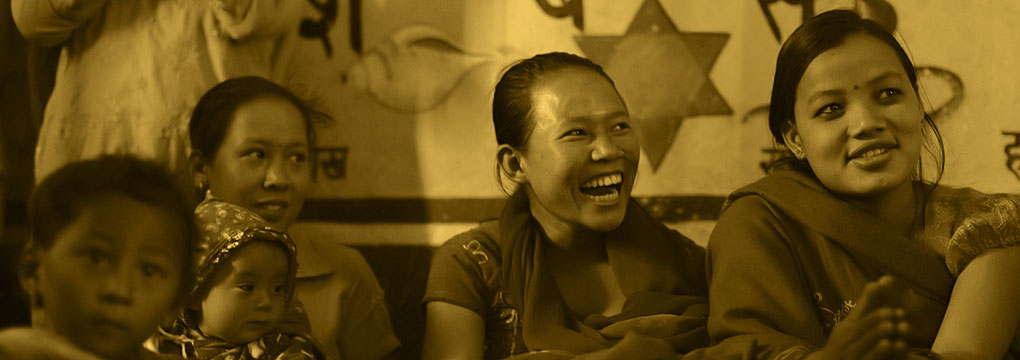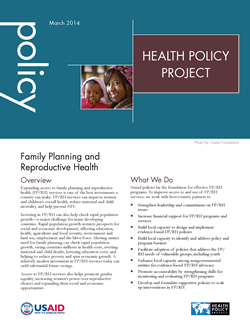The Health Policy Project ended in 2016. Work continued under Health Policy Plus (HP+) until 2022.
Family Planning and Reproductive Health

Laura Elizabeth Pohl/Bread for the World
Overview
Expanding access to family planning and reproductive health (FP/RH) services is one of the best investments a country can make. FP/RH services can improve women and children’s overall health, reduce maternal and child mortality, and help prevent HIV.
Investing in FP/RH can also help check rapid population growth—a major challenge for many developing countries. Rapid population growth restricts prospects for social and economic development, affecting education, health, agriculture and food security, environment and land use, employment and the labor force. Meeting unmet need for family planning can check rapid population growth, saving countries millions in health costs, averting maternal and child deaths, lowering education costs, and helping to reduce poverty and spur economic growth. A relatively modest investment in FP/RH services today can yield substantial future savings.
Access to FP/RH services also helps promote gender equality, increasing women’s power over reproductive choices and expanding their social and economic opportunities.
What We Do
Sound policies lay the foundation for effective FP/RH programs. To improve access to and use of FP/RH services, we work with host-country partners to
- Strengthen leadership and commitment on FP/RH issues
- Increase financial support for FP/RH programs and services
- Build local capacity to design and implement evidence-based FP/RH policies
- Build local capacity to identify and address policy and program barriers
- Facilitate adoption of policies that address the FP/RH needs of vulnerable groups, including youth
- Enhance local capacity among nongovernmental entities for evidence-based FP/RH advocacy
- Promote accountability by strengthening skills for monitoring and evaluating FP/RH programs
- Develop and formulate supportive policies to scale up interventions in FP/RH
- Integrate gender equality into national health programs and policies to ensure that women have access to high-quality FP/RH services
We also work with host countries to improve health outcomes by addressing barriers related to gender inequalities, socioeconomic status, health systems operational issues, and other factors that prevent women and men from accessing the FP/RH services they need.
Strengthening Leadership and Commitment
Leadership and commitment are vital to the success of FP/RH policies and programs—increasing resources and contributing to long-term sustainability. HPP works with host-country partners to foster local leadership and commitment by helping decision makers understand the health, social, and economic benefits of investing in FP/RH services. We support high-level policy dialogue and encourage broad-based participation in the FP/RH policy process. We strengthen the evidence base to demonstrate the impact of FP on maternal and child mortality. We create and pilot tools that help policymakers understand the costs and benefits of expanding FP services. We also generate support by helping ensure that programs and services maximize available resources.
Building Capacity to Advocate for FP/RH Services
Advocacy plays a key role in expanding access to high-quality FP/RH services. Advocacy can help foster leadership and commitment and lead to increased investment in FP/RH programs and services. Advocates can bring attention to inequities in access to FP/RH commodities and services and help hold decision makers and implementers accountable to their commitments.
HPP builds the capacity of government and civil society to advocate for equitable access to high-quality FP/RH services. We provide financial and technical support, training, and mentoring to strengthen capacity to design and carry out effective advocacy strategies, use data and information in advocacy, apply tools, and foster policy dialogue. We generate and compile data and create tools to support FP/RH advocacy efforts. We facilitate dialogue between government and civil society at national and local levels and help women leaders enhance the role of women in FP/RH policymaking.
Our partners include multisectoral government bodies, parliamentarians, non-governmental organizations, watchdog groups, networks of indigenous women, people living with HIV, and religious leaders. We place particular emphasis on building the capacity of marginalized and vulnerable groups to engage in the policy process.
Enhancing Contraceptive Security
Contraceptive security—ensuring that individuals are able to choose, obtain, and use high-quality contraceptives whenever they need them—is a key component of sustainable FP/RH services. Achieving contraceptive security requires political commitment from national governments, strong supply chains, adequate country financing to procure commodities, private sector involvement, the ability to plan for the longer term, and the local capacity to develop and implement contraceptive security strategies.
HPP provides evidence, builds capacity, and fosters policy change to enhance contraceptive security. We work with local partners to promote supportive policies and sustainable financing mechanisms and explore alternative procurement options. We generate data for decisionmaking and create tools, such as the GAP Tool, that help policymakers identify funding gaps that undermine contraceptive security. We also design and implement subnational multisectoral approaches to enhance contraceptive security—working with local authorities, service delivery points, and civil society to ensure that equitable and high-quality FP/RH services are demanded, provided, and monitored.
Publications and Resources
Estimated Resource Needs and Impact of Mozambique’s Plano Estratégico do Sector Saúde, 2014-2019
Stewardship for FP2020 Goals: Working with the Private Sector
Stewardship for FP2020 Goals: The Role of Parliamentarians
Stewardship for FP2020 Goals: MOH Role in Improving FP Policy Implementation
The Benefits of Family Planning to Avert Infant and Child Deaths in Ethiopia
Tracking the Innovative Use of Alcohol Taxes to Support Family Planning: Guatemala
Crosswalk of Family Planning Tools: A Guide to Costing, Planning, and Impact Analysis Tools


